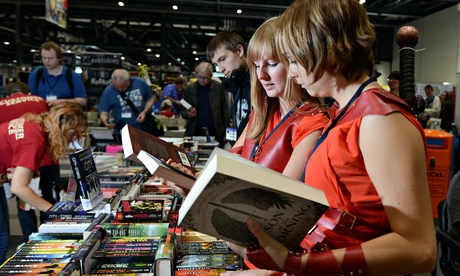
American author Ann Leckie secured her place in the annals of science fiction history after her debut novel, Ancillary Justice, was named best novel at the prestigious Hugo awards. In a ceremony held on Sunday night at London's ExCel centre, as part of this year's 72nd World Science Fiction convention, the novel – a space opera narrated by the artificial consciousness of a starship – was awarded the highest accolade, making it one of this year's most garlanded science fiction books.
Leckie has been cited as "science fiction's next big thing" after Ancillary Justice won the 48-year-old author a Nebula award, the esteemed Arthur C Clarke award, the British Science Fiction Association award and now a Hugo.
Speaking directly to the hundreds of fans who occupied the darkened auditorium, Leckie said: "Most of all, I would like to thank you. You write alone, but you write hoping that there will be readers who will connect with what you write and it's so wonderful and amazing – I can't even tell you – when that actually happens. Thank you so, so much."
The Hugo awards are one of the biggest events on the science fiction calender. Named after Hugo Gernsback, the founder of the pioneering science fiction magazine Amazing Stories and the man who coined the word science fiction, they are awarded based purely on votes by the public. This year, 3,587 ballots were cast.
Other major winners included John Chu, who won best short story for his deeply personal work The Water that Falls on You from Nowhere, which grapples with questions of sexuality and tradition within a fantasy framework.
Picking up the award, a visibly overwhelmed Chu described the challenges he faced in getting his story published. "I can't begin to describe how much this award means to me," he said. "When I started writing, so many people's words were 'I'm not racist, but …', 'I'm not homophobic, but …' There were so many buts, and they all told me, sometimes in those exact words, that no one was interested and no one would publish anything I would ever write. So to win a Hugo, and for this story, I can't put into words how much that means to me."
American science fiction writer Kameron Hurley was the only double winner of the night, picking up awards for best fan writer and best related work for We Have Always Fought: Challenging the Women, Cattle and Slaves Narrative, published in the fanzine A Dribble of Ink, which was itself named best fanzine.
In a speech read out on her behalf, Hurley paid tribute to the fans who had voted for her. She said: "I'm told blogposts don't matter. I'm told words don't matter. I'm told this by storytellers who know that the only thing that matters is words and the ideas we convey with them. I'm told this by storytellers with a deep fear of people ranting on the internet. Fans and pros write for all sorts of reasons, chief among them being love.
"I write for free online, out of love, passion and often rage. Rage that the very stories I love punch me in the face. Rage that storytellers, many of them my colleagues, grind to dust my most fervent hopes and desires for a future that includes me and others like me. It was this rage, I thought, that would preclude me from ever being nominated for a Hugo.
"Science fiction does not like change. Creators don't like being called out on their BS. But looking out at my fellow nominees, whose own work I admire so much, I suspect that it is this rage and this desire for positive change that is fuelling our future. Thank you all for championing the voices of myself and my fellow nominees."
Other Hugo award winners included Oscar-winning film Gravity, which was named best long-form dramatic presentation, and Game of Thrones, which beat several Doctor Who episodes to be named best dramatic presentation (short form) for the episode The Rains of Castamere, from season three.
Picking up the award, the show's creators David Benioff and DB Weiss recalled the moment three and half years ago when they were sitting in a theatre with George RR Martin and his wife Parris, about to show him the pilot episode of the show for the first time. "Right before the show started, we got a tap on the shoulder and it was Paris," said Benioff. "She said: 'Boys, I hope you don't fuck it up.'"
The full list of winners
Best novel Ancillary Justice by Ann Leckie
Best novella Equoid by Charles Stross
Best novelette The Lady Astronaut of Mars by Mary Robinette Kowal
Best short story The Water That Falls on You from Nowhere by John Chu
Best related work We Have Always Fought: Challenging the Women, Cattle and Slaves Narrative by Kameron Hurley (A Dribble of Ink)
Best graphic story Time by Randall Munroe
Best dramatic presentation (long form) Gravity written by Alfonso Cuarón and Jonás Cuarón, directed by Alfonso Cuarón
Best dramatic presentation (short form) Game of Thrones: The Rains of Castamere written by David Benioff and DB Weiss, directed by David Nutter
Best editor (short form) Ellen Datlow
Best editor (long form) Ginjer Buchanan
Best professional artist Julie Dillon
Best semi-pro zine Lightspeed Magazine edited by John Joseph Adams, Rich Horton, and Stefan Rudnicki
Best fanzine A Dribble of Ink edited by Aidan Moher
Best fancast SF Signal Podcast, Patrick Hester
Best fan writer Kameron Hurley
Best fan artist Sarah Webb
John W Campbell award for best new writer Sofia Samatar

